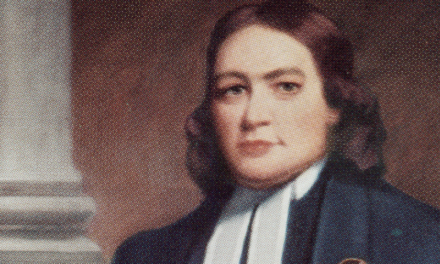Five Questions About the Majority Text
By Jeff Riddle

Introduction
Several internet pundits and critics of the TR, like Dwayne Green and Matthew Everhard, have recently suggested that the proper text of the Greek NT may be found in the so-called Majority Text (the text represented by the majority of currently extant Greek mss.).
Sometimes the Majority Text is put forward as a sort of via media between traditionalists, on one side, who hold to the TR, and progressives, on the other, who hold to the modern critical text. Such a view is problematic for several reasons, especially for those who are confessionally Reformed and affirm that God’s Word has been “kept pure in all ages” (WCF 1:8).
Five Questions
Here are five questions I’d like to see addressed by contemporary evangelical and (especially) Reformed advocates of the Majority Text:
1) If the Majority Text is the preserved true text of the Greek NT, why were there no printed editions of it completed until the late 20th century (see the editions of Farstad and Hodges, The Greek New Testament According to the Majority Text, Second edition, 1985) and how does this fit with the doctrine that God’s Word has been kept pure in all ages?
2) If the Majority Text is the preserved true text of the Greek NT, why did God in his providence not allow the Protestant Reformers and Protestant orthodox to recognize it as such and make it the standard for their scholarship, preaching, and Bible translations? Relatedly: How was the Protestant Reformation able to succeed and be blessed by God without ever having access to the “true” Bible?
3) If the Majority Text is the preserved true text of the Greek NT, why have no widely used Protestant translations of it ever been made in any language? In fact, the only NT translation of the Majority Text in English that is currently in print that I know of is that independently published on amazon by Wilbur Pickering in 2013 and titled The Sovereign Creator Has Spoken: Objective Authority for Living. As far as I know there are currently no churches anywhere in the world which make liturgical use of a New Testament translated from the Majority Text in their worship.
Our friends may respond that even though there are no viable translations of the Majority Text widely available or practically in use today, they can still have access to it either through translations based on the TR (like the NKJV) or ones based on the modern critical text (like the ESV). This, however, means that they must approve and commend editions of the Bible to their congregations which either contain passages they do not believe are original and inspired (such as Acts 8:37 and 1 John 5:7-8 in TR-based translations), or that omit or cast doubt on passages that they do believe are inspired (like Mark 16:9-20 and John 7:53—8:11 in modern critical text-based translations).
Dwayne Green has done a number of videocasts where he has doggedly asked “Which TR?” but to my knowledge he has never addressed the question, “Which Majority Text?” or “Which Majority Text Translation?” I hope we will get answers from him and other Majority Text advocates soon.
4) Given that the Majority Text is sometimes affirmed as the preserved true text of the Greek NT in part based on its usage in the Greek-speaking Eastern Church, why does the current standard printed edition of the Greek NT used by the Eastern Orthodox Church, the Patriarchal Edition (1904), essentially follow the TR and not the Majority Text (e.g, it includes Acts 8:37 and 1 John 5:7-8 without brackets or explanatory notes)?
5) If you affirm the Majority Text as the preserved true text of the Greek NT, what do you do with places in the NT (as in the book of Revelation) where there is no clear Majority Text? Must Christians be perpetually uncertain as to what the authoritative text of these passage is?
Conclusion
In the end, I think we can see that the Majority Text is not really a viable option for traditional Protestant Christians who hold to the providential preservation of the Word of God. The only viable Protestant option, IMHO, for the Greek NT remains the Textus Receptus, the traditional text of the Reformation. In the providence of God it was the consensus printed text of the Reformation and post-Reformation eras and the basis for all their vernacular translations of the Bible, and it still widely used by Bible-believing Christians and churches around the world today.





Dear Pastor Riddle,
As a Bible translator, I too am an advocate of the Byzantine/TR Greek text compilation referred to as the Majority Text–Dr. Pickering’s version, as opposed to the Farstad and Hodges initial version version. I referred to Dr. Pickering’s work (text and notations) continually when I translated the Isan New Testament, finished and distributed June 2016.
In reading/listening to your fine explanation in “Five Questions About the Majority Text” you refer to the ESV as being a reflection of the Majority Text, alongside the NKJV. Not to sound disagreeable, but It is not. The ESV is definitely a reflection of the Critical (Alexandrian) text, and can be proven so by comparing many passages. One of my favorite “go-to” comparison passages is Colossians 1:14. I have listed a few English versions below for comparison purposes.
Copied from BibleGateway.com
KJV: In whom we have redemption *through his blood*, even the forgiveness of sins:
NKJV: in whom we have redemption *through His blood*, the forgiveness of sins.
NASB: In whom we have redemption, _____ the forgiveness of sins.
NIV: in whom we have redemption, _____ the forgiveness of sins.
ESV: in whom we have redemption, _____ the forgiveness of sins.
By God’s Grace and for His Glory!
Yours In Christ,
Ron Myers
San Diego area
Baptist World Missionary Outreach Min.
Chattanooga, TN, 37404
Continued:
Dear Brother Jeff,
If you refer to the Gideon version of the ESV (I have no viable clue why they switched from the NKJV to the ESV) you’ll find that *through his blood* is in the Colossians 1:14 ESV text. That’s because the Gideon people in charge decided to add it to the text, of which it is missing, unfortunately. Purportedly, the ESV is the work of, and is advocated by the Reformed community.
In Christ,
Ron Myers
Translator and Church Planter to Thailand’s vast Northeastern (or Isan) Region
Baptist World Missionary Outreach Min.
Chattanooga, TN, 37404
Hi Ron, with respect, I think you misunderstood my point. I did not say that either the ESV or NKJV were based on the Majority text. I did say that because the ESV is based on the modern critical text and the NKJV on the TR (in the NT), so that those who prefer the Majority text cannot find satisfaction in either. Of course the main point is that there are NO viable translations made from the Majority text.